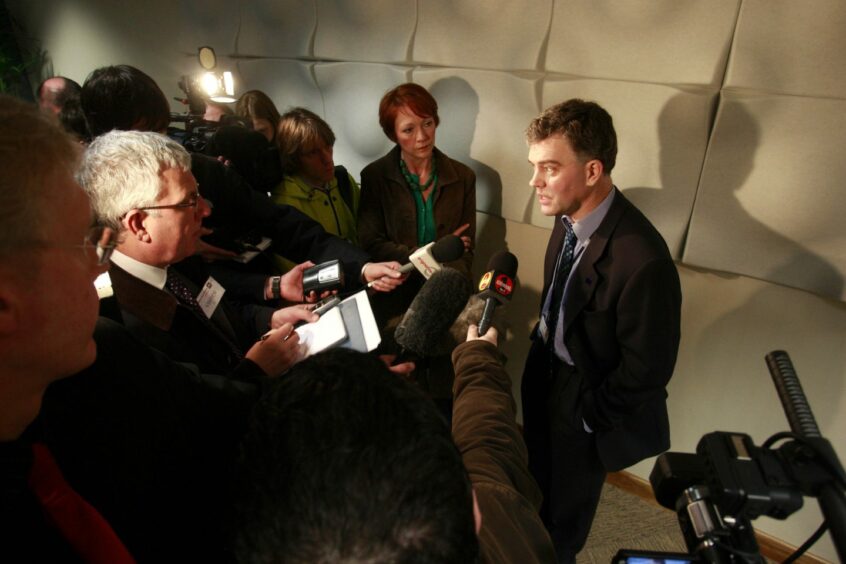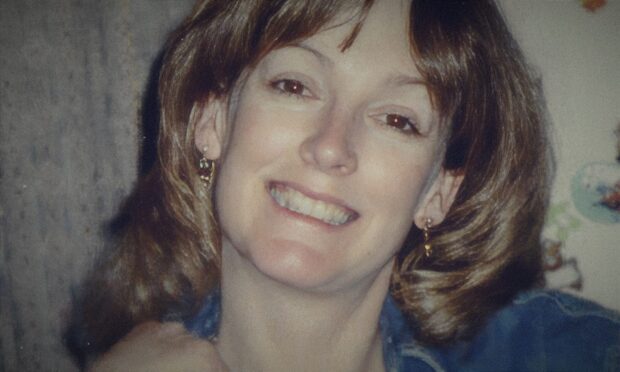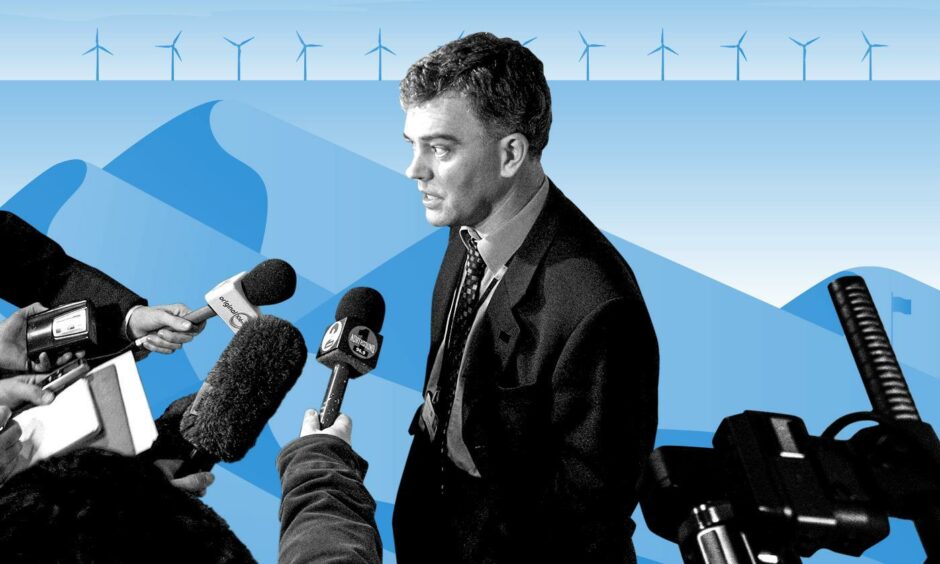
In part three, we heard how seven councillors voted at an Aberdeenshire Council meeting to reject Donald Trump’s bid to build a £1bn golf resort in the north-east, sparking a vicious public response.
Here in part four, we reveal how politicians desperately tried to revive the project, leading to even more controversy.
Those who walked the corridors at Aberdeenshire Council’s headquarters told us the council was in disarray due to the public outcry against the decision.
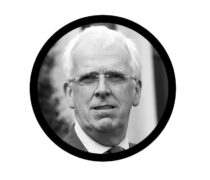 Jim Gifford, a long-standing councillor, said: “There absolutely was an element of headless chickens the day after the Infrastructure Services Committee (ISC) meeting (when the golf resort was rejected). It was unchartered territory.”
Jim Gifford, a long-standing councillor, said: “There absolutely was an element of headless chickens the day after the Infrastructure Services Committee (ISC) meeting (when the golf resort was rejected). It was unchartered territory.”
Alex Salmond, who was then First Minister and Gordon MSP, told us civil servants were shocked because there had been no expectation of the ISC turning down the resort.
He added: “The day after the meeting, I got phone calls from a number of people (from Aberdeenshire Council) desperate to get them off the hook.
“They were buckling under the pressure.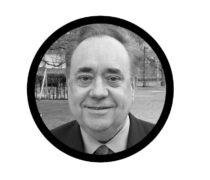
“There is a small part of you that says ‘let them stew in their own juice’ because they were mostly my political opponents.
“Public opinion was outraged. The chief executive (Alan Campbell) thought the credibility of the entire council was at stake.
“He was frightened about the council’s reputation being irreparably damaged at being able to properly process developments.
“Scottish Development International said to me ‘look, we’re going to have real problems here because investors throughout the world will say ‘I’ll put forward a proposition and you’ll kick me in the teeth.’”
Keeping the Trump golf course plan alive
Witnesses have painted a picture of those involved being at sixes and sevens to find a way forward in the face of an international media storm and outrage from the north-east business community.
 On that day, the council’s Lib Dem leader Anne Robertson, now Stirling, made a statement which read: “This development has the potential to be an extremely important diversification of our economy and I personally will do all I can to keep the application alive.”
On that day, the council’s Lib Dem leader Anne Robertson, now Stirling, made a statement which read: “This development has the potential to be an extremely important diversification of our economy and I personally will do all I can to keep the application alive.”
Some were puzzled as to why the leader was seemingly speaking in favour of a project her own council’s committee had thrown out and suggested she was making moves to overturn it – against the democratic process.
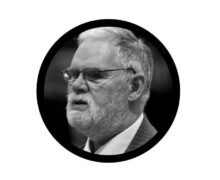 Stuart Pratt, one of the councillors who had voted on the project the day before, took the view that Stirling was merely trying to placate all sides.
Stuart Pratt, one of the councillors who had voted on the project the day before, took the view that Stirling was merely trying to placate all sides.
He said: “It was the Lib Dems trying to do be what they always want to be – all things to all men.”
ISC chairman Marin Ford, who had endured the lion’s share of the criticism after the vote, said: “Stirling then busied herself trying to overturn the decision. She has never explained why.”
Stirling said: “I didn’t busy myself overturning a decision. That wasn’t for me to do. It wasn’t possible.
“If others feel (the way things were handled) was wayward that’s a matter for themselves.”
Stirling, who was at the centre of things that day, said: “It was global.
“It was a very difficult period because the application was one aspect of the council’s work and there were other pressures on the council at the time.”
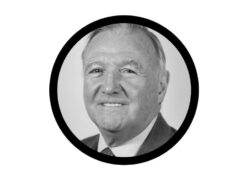 Lord Bruce, who was Gordon MP at the time, said he called Alan Campbell, to enquire about the chance of another vote, this time for all 70 Aberdeenshire councillors.
Lord Bruce, who was Gordon MP at the time, said he called Alan Campbell, to enquire about the chance of another vote, this time for all 70 Aberdeenshire councillors.
He told us: “There were other councillors who had been excluded from the process and were angry.
“So my point was ‘is there any mechanism you can pull it to the whole council?”
However, that was an attempt to re-write the rules after the fact.
Lord Bruce said: “I didn’t have a view about the outcome – I didn’t like the way the decision had been arrived at because the council had adopted procedures which were relatively new.”
After previously voting in favour of the project at the area committee and expressing her intention to keep the application alive just a few hours earlier, Stirling tried to change things.
“It was though a game had been played and they didn’t like the result so was ordering a rematch until they got the outcome they wanted, which perversely undermines democracy,” said one senior council source.
Stirling said: “That is their view. I would not suggest that that’s the case.”
An Aberdeenshire Council spokesman described the council source’s comment as “a matter of opinion”.
As the day wore on, the council’s lawyers were asked if the ISC’s decision could be overturned.
An Aberdeenshire Council spokesman said it did not have a record about who requested this information.
At any rate, the lawyers’ response was ‘no’.
This should have come as no surprise as, before the ISC meeting, Martin Ford had asked that very question of the council’s legal adviser Gordon Davison.
 Ford told us: “I spent a couple of hours asking ‘what if?’ questions that day.
Ford told us: “I spent a couple of hours asking ‘what if?’ questions that day.
“One was ‘can this be referred on to full council?’ I got an unequivocal ‘no’.”
This was because the council’s rules forbade one committee from overturning another committee’s decision for at least six months.
Special council meeting
Despite being told the same thing, Stirling ignored it and was the first to sign a demand for a special council meeting.
Sixteen more signatures were needed. Twenty seven signed including 12 Lib Dems – in direct opposition to their fellow Lib Dem, Martin Ford.
A quarter all councillors’ signatures was needed to achieve that – and it happened.
27 people signed the letter demanding a special meeting.
Spread across the political spectrum.
With 12 of them coming from Martin’s own party the Liberal Democrats.
Despite the meeting minutes showing her name at the top of the list of signatories, Anne Stirling said she couldn’t remember if she signed the meeting demand.
She added: “I don’t have a recollection of the detail of how that (meeting) came about.
“If members of the council felt they wanted the opportunity to discuss it in light of the ISC decision, there was clearly enough people to do that in order to call the meeting.”
Martin Ford said: “The meeting was called without any clear idea of what it was going to achieve.”
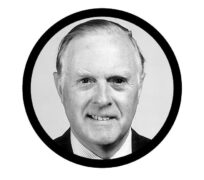 Veteran councillor Marcus Humphrey added: “The council leader was seeking to hold a public meeting with no real sense of what could happen there.”
Veteran councillor Marcus Humphrey added: “The council leader was seeking to hold a public meeting with no real sense of what could happen there.”
Paul Johnston likened Stirling’s actions to the political comedy series The Thick of It, in which politicians back policies one minute then oppose them the next.
He added: “It was very much like that.
“Martin did absolutely everything perfectly correctly. His problem was he didn’t wear a suit and wasn’t ‘one of them’.”
Stirling said she cannot recall what she wanted to be discussed at the special meeting.
She added: “I’m presuming the council would set out its position.
“I cannot hand on heart tell you exactly the conversations (that were had) because I don’t have that to hand.”
An Aberdeenshire Council spokesman did not comment except to draw attention to the meeting agenda.
As if it weren’t bad enough that there was enough support for a meeting at which Ford’s casting vote would be analysed, things got even worse for him.
No confidence in Martin Ford
Councillors heard on the Woodhill House grapevine that pro-golf-course councillor John Cox was to table a motion of no confidence against Ford and call for him to resign as ISC chairman.
 Cox told us: “You can’t have a chairman sat there saying ‘I’m opposed to development’ when the council’s own policy says ‘we want to encourage development’.”
Cox told us: “You can’t have a chairman sat there saying ‘I’m opposed to development’ when the council’s own policy says ‘we want to encourage development’.”
Debra Storr accused Cox of tabling the motion for political point-scoring purposes,
However, Cox told us he called for the vote in a bid to install an ISC committee chairman or woman willing to boost investment.
He added: “My background is business. I want to see jobs.
“Aberdeen was tied to oil. It had to reinvent itself and shake itself up.
“It was getting to the point where I felt Martin’s environmental views outweighed the council’s strategic development policies.”
 Another pro- development member, Albert Howie said: “Martin was holding back Aberdeenshire. I was getting fed up of him altogether.
Another pro- development member, Albert Howie said: “Martin was holding back Aberdeenshire. I was getting fed up of him altogether.
“He wasn’t respecting the wishes of most of the people.”
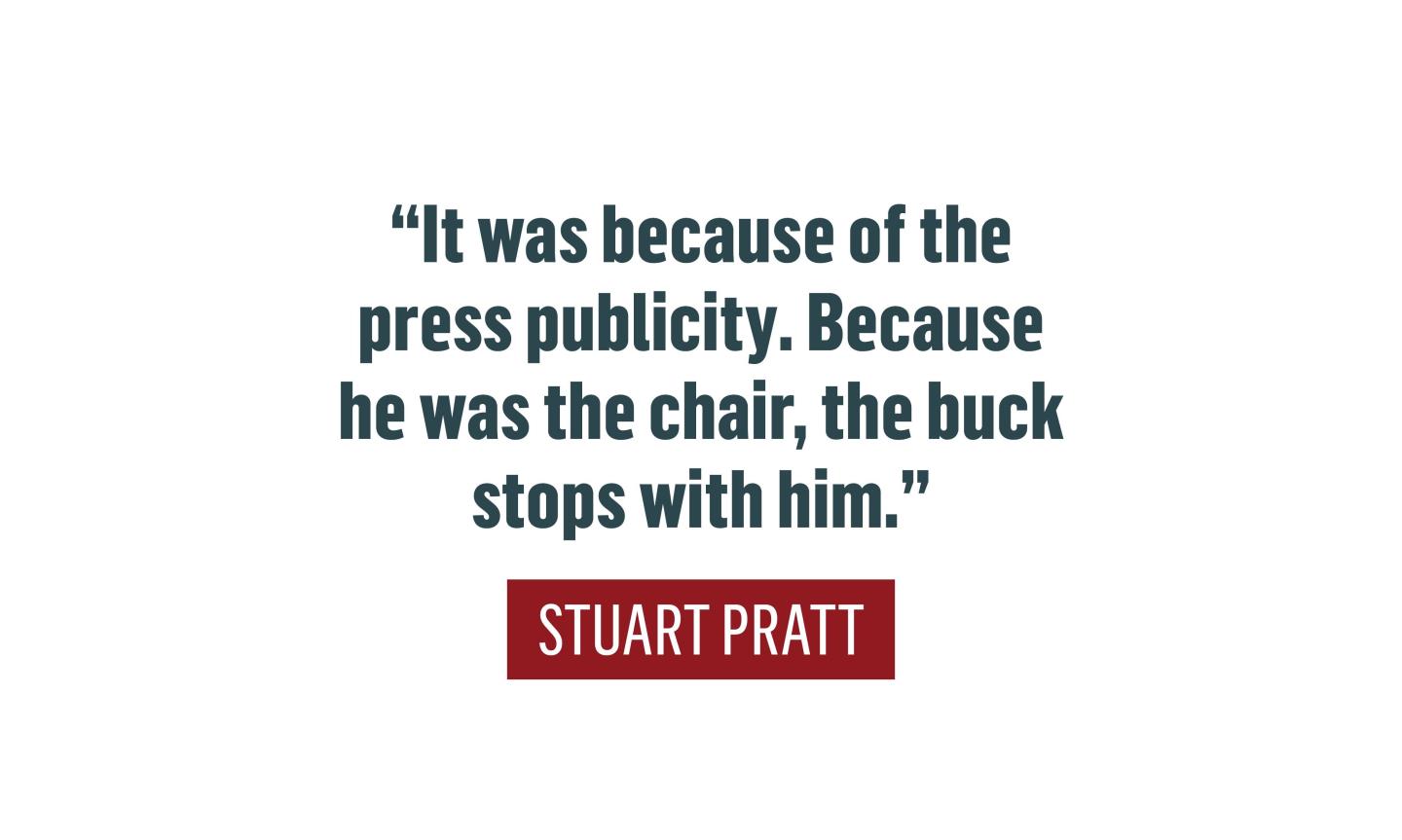
Pratt suggested the meeting and the no-confidence vote came about because somebody had to pay for what most of the public perceived to be an error.
He said: “It was because of the press publicity. Because (Ford) was the chair, the buck stops with him.”
When asked if there was a danger of chairmen and women being sacked every time there is a media storm, Pratt said: “We’re not speaking here about a somewhat near-normal run-of-the-mill media storm. This was something else.”
The Liberal Democrats went into crisis mode.
Many within the party were simultaneous praising Ford for chairing the ISC meeting well and seeking to overturn the ISC’s decision.
Ford describe Lib Dem group meetings as “hostile and unruly”.
Ford said: “They were the worst meetings in my life. People were shouting at each other.”
Some urged Ford to trade his ISC role for another committee chairman position as a way of saving face – but Ford refused.
He said: “The moment I did anything that looked like resigning I had effectively conceded I made some kind of error – and I hadn’t.
“The notion that the local press tries to get this decision overturned – that you will remove the chairman of the planning committee – is a deeply dangerous thing to do.
“In future, the question in (the mind of a committee chairman or woman) won’t be ‘does this fit planning policy?’ it will be ‘what will happen to me if I don’t agree to it?’”
Lord Bruce said: “There was a lot of bad feeling because Martin had been a dedicated campaigner.
“People did not want to lose him but he did make it difficult.
“It’s all very well being principled, but not having consideration for your colleagues (is bad).”
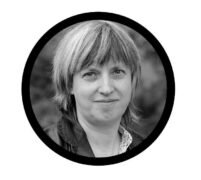 Storr described one group meeting as “poisonous”.
Storr described one group meeting as “poisonous”.
She added: “I ended up in tears and I’m not a weak person but the degree of bullying going on at that meeting was unbelievable.
“I had at least two people shouting in my face at that meeting. Bill Howatson was one.”
Bill Howatson did not wish to comment for this article.
Johnston accused Stirling of wanting Ford to resign as ISC chair.
He added: “(The mood was) ‘Martin we know you have done nothing wrong, but you still have to go’.”
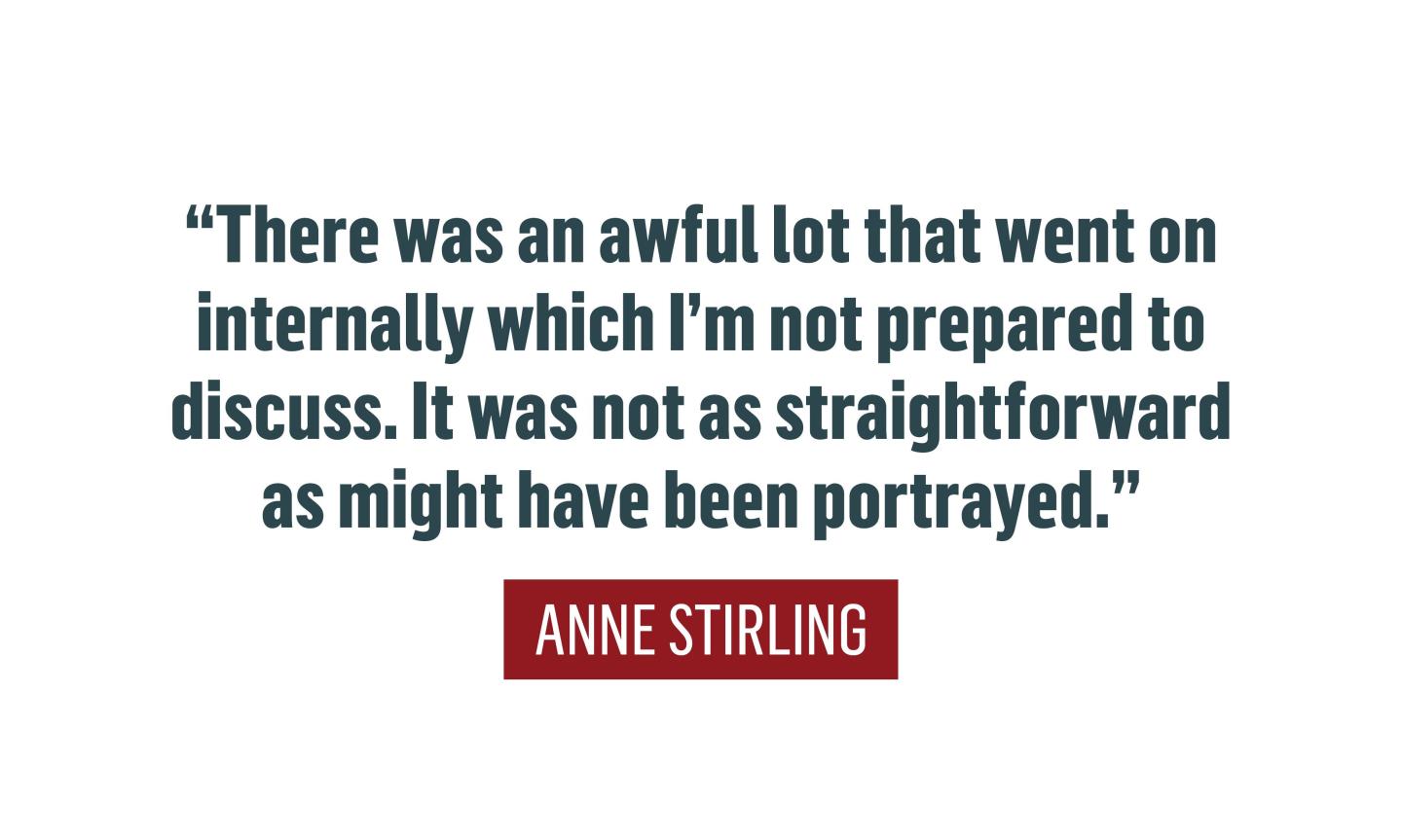
Others defended Stirling.
Jim Gifford said: “She did the best she could. The characters involved would drive anyone to distraction.”
Albert Howie agreed. He said: “Stirling was a very good councillor. She never sided with the militants.”
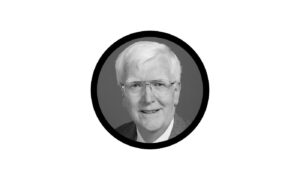 Ian Mollison, added: “There’s an awful lot of learning points from these meetings. Both sides (within the Lib Dem group) should have done things differently and I wished they had.”
Ian Mollison, added: “There’s an awful lot of learning points from these meetings. Both sides (within the Lib Dem group) should have done things differently and I wished they had.”
 Stirling said: “There was an awful lot that went on internally which I’m not prepared to discuss. It was not as straightforward as might have been portrayed.”
Stirling said: “There was an awful lot that went on internally which I’m not prepared to discuss. It was not as straightforward as might have been portrayed.”
Debra Storr questioned why, if some of her party colleagues were so concerned about Ford’s environmental credentials, did they nominate him for the ISC chairman role six months earlier.
She said: “Anybody who wanted to pretend they didn’t know during the nomination process that Martin was a committed environmentalist, is lying.”
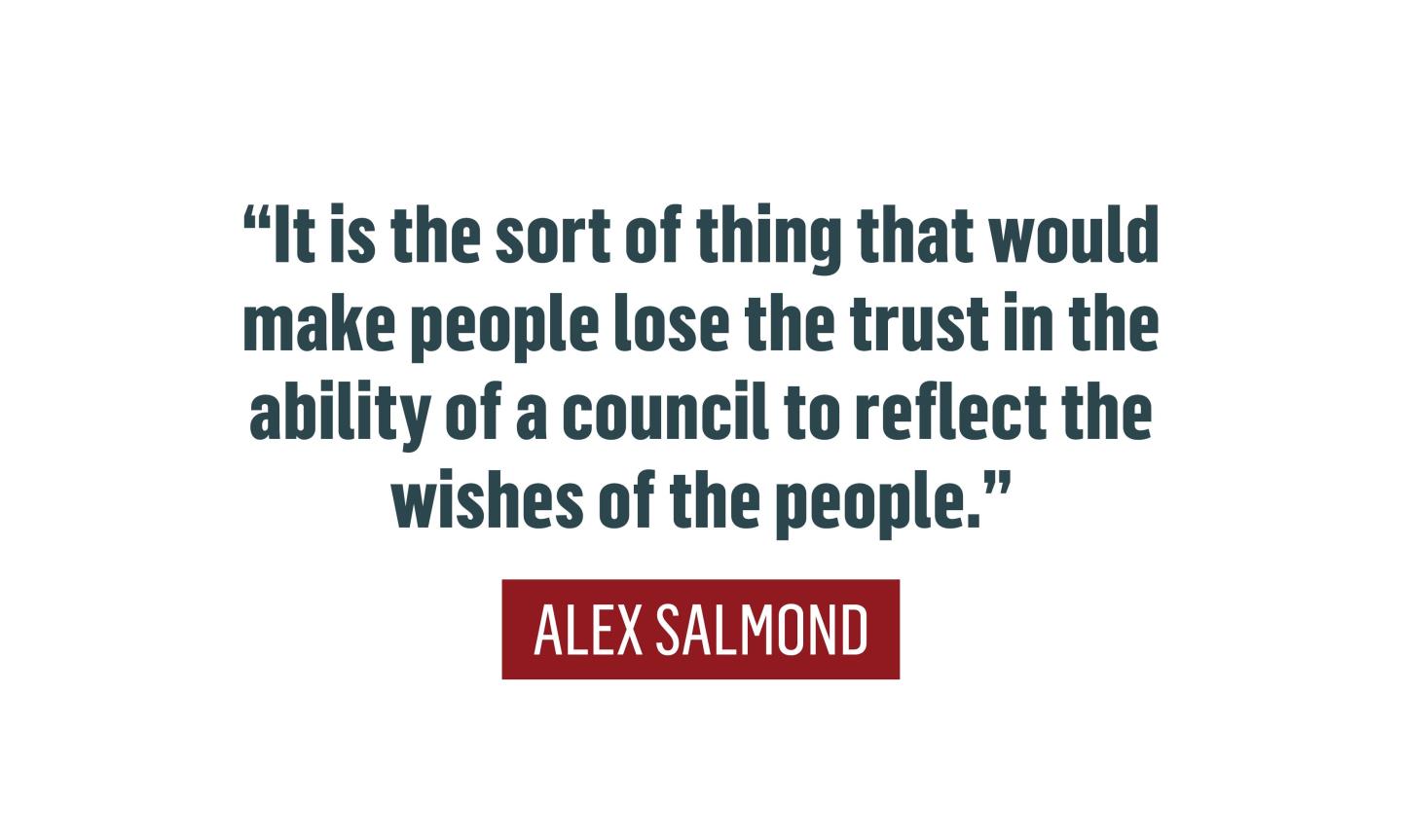
Alex Salmond added that it was “obvious” that some might see efforts to overturn the ISC’s decision as corrupt but that doing so would respect the views of all Aberdeenshire councillors.
He added: “I’d never heard of a situation where a committee of a council couldn’t have its recommendation voted on by a full council.
“At that stage they were stumped.
“If you did nothing, people would say ‘there was a chance to have a tourist magnet and it was turned down by a sub-committee of a council against the wishes – as we understand – of the full council and the overwhelming body of public opinion’.
“It is the sort of thing that would make people lose the trust in the ability of a council to reflect the wishes of the people.”
Council flip flop
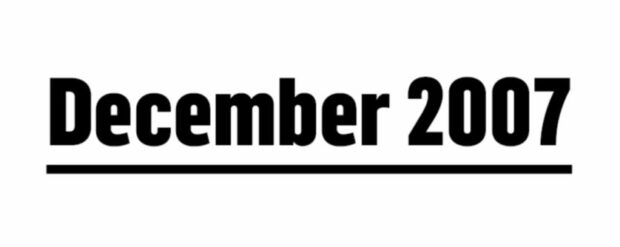
That special full council meeting would take place at Woodhill House on December 12, 2007 and would prove to be very controversial.
First, councillors voted to ensure future major planning applications would be decided upon by all councillors rather than just 14.
Stuart Pratt said: “Up until then, a very small number of councillors could dictate council policy on major applications impacting a large amount of people. I thought it was wrong (and needed changing).”
Second, it was decided – without a vote – that the council “agreed the view of the council…was the council supported the granting of planning permission (for the golf resort).”
It was Stirling who spoke in favour of this decision.
She stated: “The decision of the ISC had been to overturn the area committee’s decision.”
The word ‘overturn’ got people’s backs up because the ISC had not, in fact, overturned anything.
Debra Storr explained: “The area committee was effectively asked for an opinion to inform the ISC. The ISC didn’t overturn it.”
Some of those present at the special meeting accused Stirling of breaking council rules by challenging a committee decision made within the previous six months.
But in a strange case of double jeopardy, they felt they could not speak up and challenge her at the meeting – as to do so would risk breaking the same rules.
As a result, the matter was decided without any opposition.
Ford said: “Because of everything going on, nobody felt they had the power to challenge it.”
Stirling told us she did not break the rules and other councillors were free to ask the council’s monitoring officer for guidance.
She said: “If people had been minded to ask any questions, the monitoring officer would have advised them on whether they could have put an amendment down.”
Records from the time show the council’s legal adviser Gordon Davison said the ISC’s decision could be debated because, by the time the special meeting rolled round, the Scottish Government had taken control of the golf resort application.
That meant it was no longer a case of the councillors at the special Full Council meeting seeking to reverse a decision of another committee.
An Aberdeenshire Council spokesman said: “The decision of Full Council was to put forward a view to the Scottish Government, in the context of having the status of an enhanced consultee.”
However, at least one councillor, Alastair Ross, wrote to the chief executive to raise concerns about this alleged rule break.
An Aberdeenshire Council spokesman said the council had been unable to source information concerning such a complaint before we went to press.
At any rate, within the space of 13 days, the council had done a complete flip flop – firstly opposing the resort plan, then backing it.
Martin Ford sacking ‘a sacrificial-lamb scenario’
Third, councillors voted on whether to express no confidence in Ford and to sack him as ISC chairman.
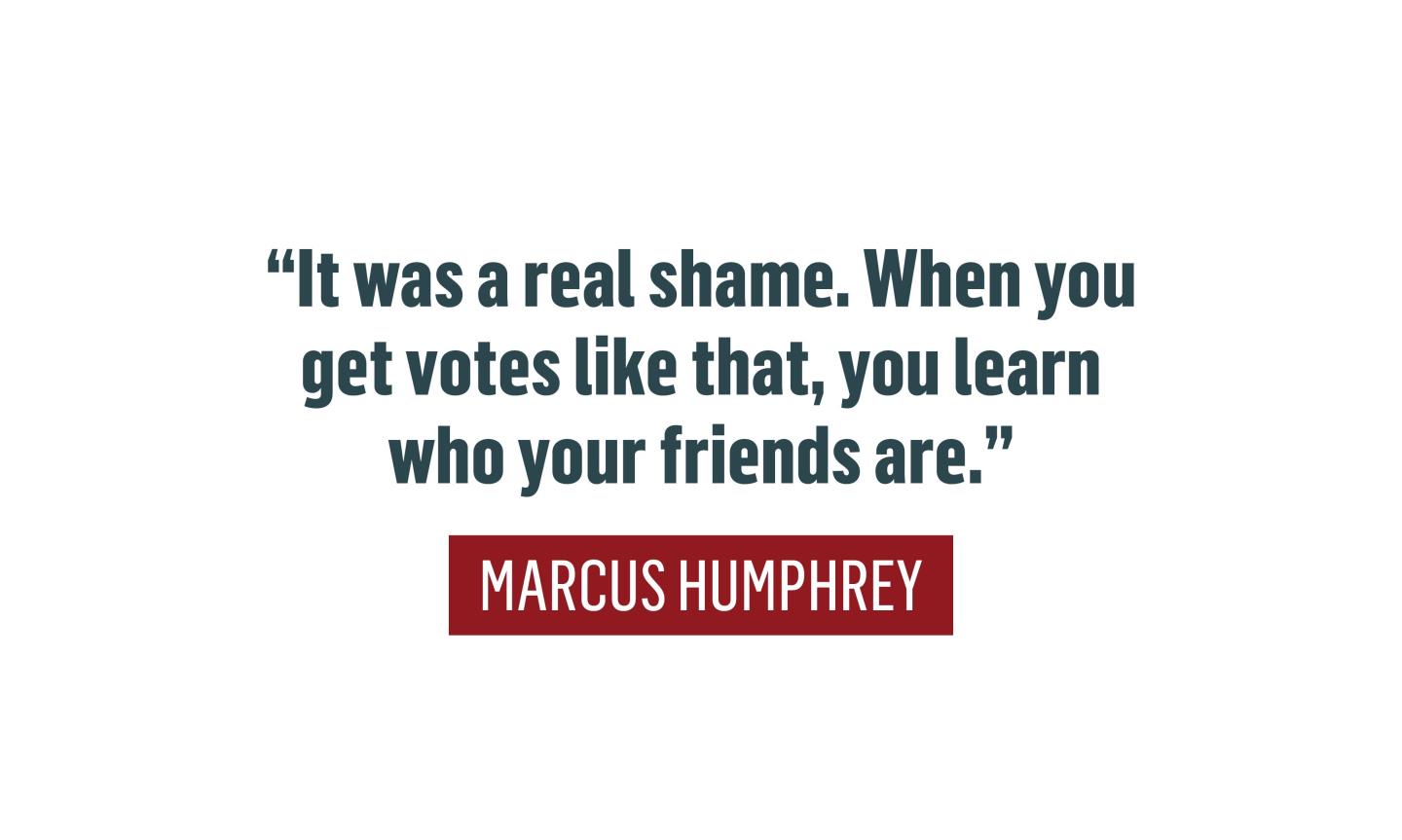
At the time, the council administration was run by a coalition of Lib Dem, Conservatives and independents, with the SNP in opposition.
Jim Gifford, a Conservative at the time, said: “I abstained. The majority of Conservatives thought Martin got it wrong.
“We wanted to keep the administration on the straight and narrow so we could carry on with all the other business of the council, which was not insignificant.”
Another Conservative Marcus Humphrey also abstained. He said: “It was a real shame. When you get votes like that, you learn who your friends are.”
Ian Tait and Graeme Clark stunned people in the room when they voted to sack Ford for rejecting the golf resort – even though both also rejected the golf resort.
Johnston said: “(Iain) Tait is something else, he really is.”
Storr added: “Ian Tait has no love for Martin personally, professionally or anything else.
“I doubt Graeme enjoyed being a councillor much and there are some people who can get heavily lent on bullied by their group.”
Tait did not want to comment for this article.
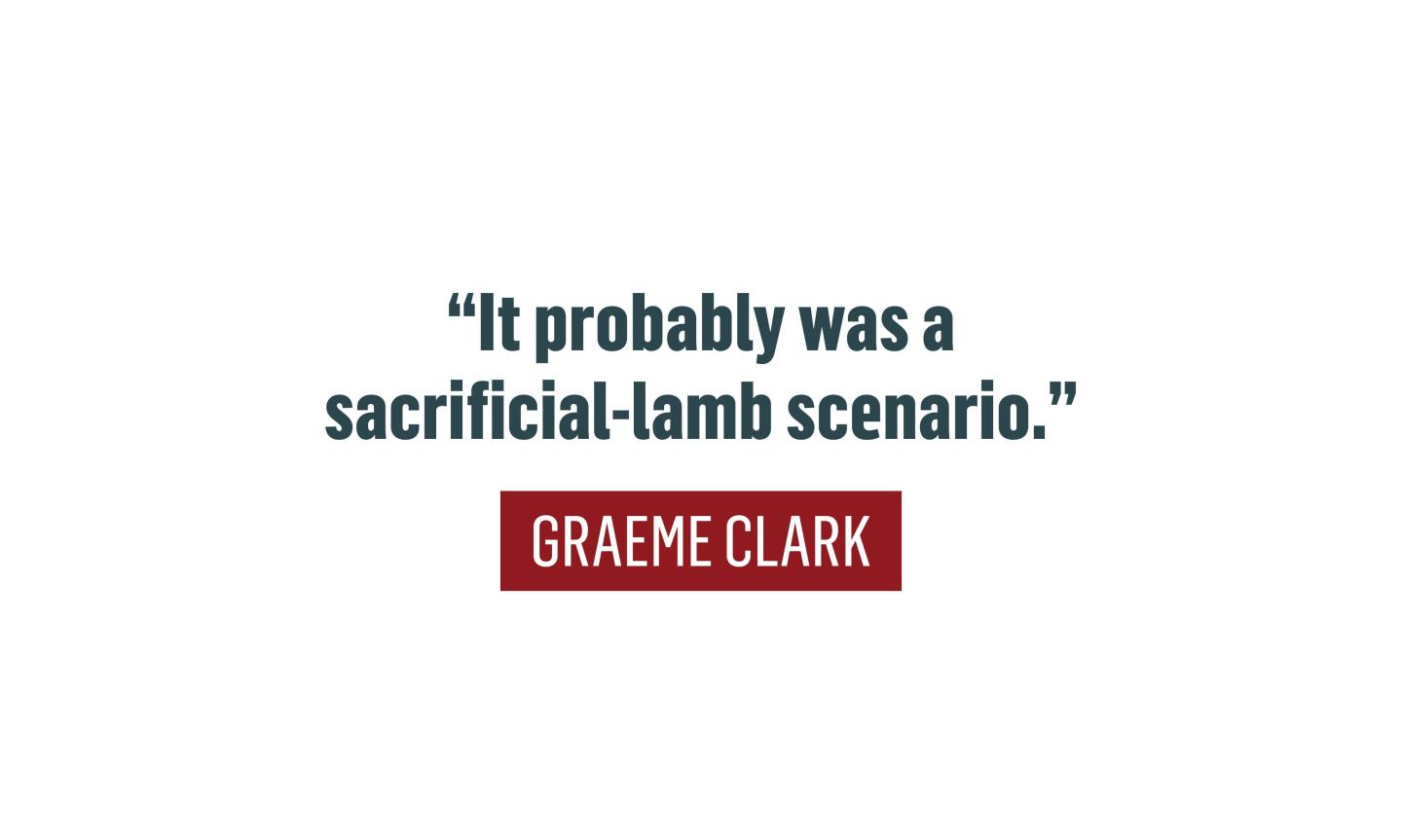
 Clark, who was an SNP councillor, said he was merely following party instructions and added: “It was done with a heavy heart. I felt sick in my stomach because I had a lot of time for Martin.
Clark, who was an SNP councillor, said he was merely following party instructions and added: “It was done with a heavy heart. I felt sick in my stomach because I had a lot of time for Martin.
“He is really an excellent councillor. It was sickening for me to press that button.
“It probably was a sacrificial-lamb scenario.”
Martin Ford would be sacked unless enough Lib Dems voted to back their man.
Among the Lib Dems who abstained was Ian Mollison.
He said: “Although it’s no excuse, I was new to all of that. When you are the new kid on the block, you are guided by those with more experience.
“Had it been now I probably would have been more proactive.
“It was the most unpleasant time and not one that I would wish to repeat.”
Jim Gifford said: “I remember clearly the gasp in the council chamber when the Provost addressed the first (administration councillor) to vote and they said ‘abstain’.”
Stirling was another to abstain, sparking allegations that she had abandoned one of her group’s councillors.
Addressing that, Stirling said: “I’m not going to divulge what went on behind the scenes.
“I made that decision based on what had happened up to that point.”
Debra Storr said: “That meeting of the full council was the most appalling thing I have ever seen.
“We knew the opposition were going to go for Martin’s scalp. We knew Anne Stirling was on their side.”
Stirling suggested internal Lib Dem discussions were had before that vote which justified her abstention but she did not want to give detail.
She said: “Debra (Storr) has her own views. The lead-up to that decision that I took – I’m not going to make it a matter of public record.”
In total, 26 opposition councillors backed the motion, 10 of Ford’s Lib Dem colleagues opposed it and another 29 abstained.
Ford was sacked.
Read part five next
Credits
- Words by Dale Haslam
- Story design by Cheryl Livingstone
- Graphics and illustrations by Roddie Reid
- Data visualisations by Lesley-Anne Kelly
- Video trailer by Drew Farrell
